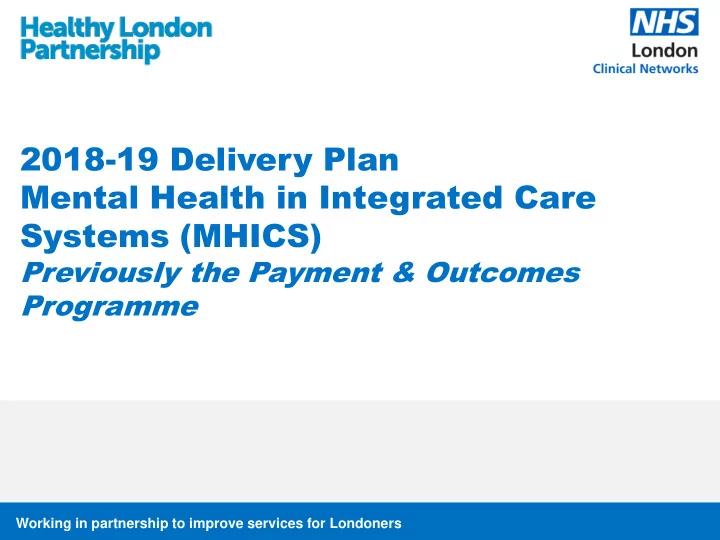

2018-19 Delivery Plan Mental Health in Integrated Care Systems (MHICS) Previously the Payment & Outcomes Programme Working in partnership to improve services for Londoners
Ment Mental al Hea Health lth in in Inte Integrate ted d Car Care e Systems Systems (MHICS (MHICS) Overview • Why this work is important • Understanding Value • Mental health commissioning information • Issues with Mental Health commissioning • MHICS 18/19 work programme in context • Outcomes of the MHICS work programme
Why this work is important Why hy th this w is wor ork k is is impor importa tant nt • Understanding value: • making the case for Mental Health as part of integrated care systems development. • Parity of esteem – same level of understanding of Mental Health as Physical Health • Better informed clinicians on the outcomes from the care they provide • Better informed commissioning decisions based on greater understanding of mental health population needs • Sharing good practice and resources – where appropriate at a pan London- level
Understanding Value Understanding the needs of the individual / population Identify the most Identify clinically appropriate meaningful goals and interventions; right measures to support treatment first time improved health and wellbeing Epidemiology Value Provide information on pathways of care. Inform service users of Better information, clinical effectiveness; more transparent and Outcome Activity builds confidence and informed choice and Measures and Price informs expectation expectation. Articulating how we Understanding clinical meet a group’s needs. outcomes and patient Articulating the services experience of the care Outcome measures Articulating the we provide, pathways we provide identify the impact of specific interventions and service user choice interventions and help delivered improves us identify the most understanding of their effective pathways impact on outcomes 4 Credit: Birmingham and Solihull Mental Health NHS Foundation Trust
Mental Health commissioning information Outcome Activity and Epidemiology Measures Price Clusters & Diagnosis Interventions PROM, CROM, PREM* Care Clusters Outcomes Interventions • • • 21 broad groups Take place at review Take place within cluster • Diagnostically informed episodes points • • Reflect overall needs Episodes Different measures used • Diagnosis to capture broad picture Different settings 5 Credit: Birmingham and Solihull Mental Health NHS Foundation Trust
MH commissioning – wider system issues • MH data is not consistently available or presented in a way that allows benchmarking or analysis, ! • There is a lack of confidence in nationally reported data systems vs Trust propositions • Regional ‘value’ propositions are not uniformly understood, applied in the same manner and communicated across all STP programmes. • Mental Health’s contribution to, and impact on, the overall activity and cost within an STP is not understood nor quantified. • Lack of clarity and pace in understanding and implementing payment reform Value Value Outcome Activity and Epidemiology Measures Price Clusters & Diagnosis Interventions PROM, CROM, PREM* ! ! ! Care Clusters Interventions Outcomes • • • Variance in clustering Care is less prescriptive Outcomes have multiple • • Activities aren’t effectively Debate in contracting components (symptoms, Diagnosis reported wellbeing, perspective) • • Variance in practice – • Diagnosis is a poor Variance in outcome indicator of intensity of including use of bed measures used and need based care analysis of them 6
MHICS 18/19 work programme in context • Mental Health Dashboard: Value London − Develop greater functionality and add new data − Include ability to display outcomes data and system process outcomes • Support development of a summary of regional ‘value’ activities and outputs • Develop initial principles for commissioning MH services at an STP level (rather than at a CCG level) 17/18 carry Value Value over Outcome Activity and Epidemiology Measures Price Clusters & Diagnosis Interventions PROM, CROM, PREM* • Pan-London Cluster • Mapping use of outcomes • Bed Based Review Education and Training across London and sharing including multivariate packages best practice analysis and demand and • Cluster variance review • DIALOG implemented as capacity modelling • Population modelling to London-wide PROM • Agreed analytical model(s) understand cost of MH in for HoNOS (a CROM) wider system • System Outcomes • First Episode Psychosis developed (Cluster 10) audit * PROM (Patient reported outcome measure), CROM (Clinically reported outcome measure), PREM (Patient reported experience measure) 7
Outcomes from the MHICS work programme Increased readiness for Mental Health in Integrated Care systems – CCGs, Trusts and 1. STPs within London: • have a better understanding of their baseline • can benchmark finance, activity and outcomes – including draft ‘system outcomes’. • are able to demonstrate and articulate overall impact of mental health across the wider system • have a set of draft ‘commissioning principles’ for MH in ICS 2. Improved consistency and reduction in variation: • Clustering – audit and training to reduce variation • Outcomes – opportunity to understand the care they provide, consistent outcome measures and analytical approach 3. Sustainable services: • Meet acute inpatient demand through greater understanding of drivers of demand, best practice interventions and capacity • Understand variation in EIP services, and share best practice 4. Alignment with national and regional approaches 8
Recommend
More recommend